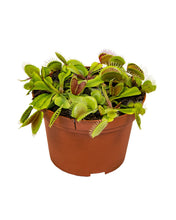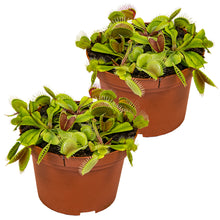Dionaea muscipula is part of the Droseraceae family and it is native to North Carolina, South Carolina where it is typically found in sandy, acidic, boggy sites in marshlands, wet grasslands and savannahs. It is listed as Vulnerable on the IUCN Red List criteria due to wild-poaching but more so by loss of habitat and fires, which alter its natural habitat.
Dionaea muscipula grow in a low-growing rosette, each leaf sits upon a flat stalk and finishes in a trap. The centre is often reddish, and the sides of the trap are lined with up to 20 stiff, comb-like bristles that interlock when the trap closes; it is plant nectar which lures insects into the trap. When an insect lands, it activates one of the three sensitive trigger hairs, the trap closes, the insect dies and over the next 4-10 days it will be digested as the leaves secrete enzymes.
Genus name means ‘Daughter of Dione’, this is in reference to the Greek goddess Aphrodite. The specific epithet is Latin for both ‘mousetrap’.
Light: Full sun is best for these plants, position on a windowsill or in a conservatory. They also grow well under white LED grow lights, for further information visit International Carnivorous Plant Society.
Water: These plants require rainwater, reverse osmosis water or distilled water; if you run out of any of these, tap water every now and then should be ok. During spring and summer do not allow the plant to dry out, sit it in 2-3cm of water the majority of the time. Don’t pour water directly onto the traps.
Cut back on watering in winter (just keep slightly damp) and position in a cool spot as it is possible the plant will experience a period of dormancy; the traps turn black and die back, it’s important to remove these to prevent mould forming.
Potting mix: It grows well in pure sphagnum moss, pure sphagnum peat, and the standard 1:1 peat:sand mix that is recommended for many carnivorous plants. Avoid perlite, pumice, and other potentially salty soil components.
“What does matter is how tall the pots are and consequently how far the crown of the plant is from the water level. The plants do not enjoy being soggy but must always be wet. The wetter the soil the taller the pot. In shorter pots the soil should be more sandy. Avoid pure Sphagnum moss or pure peat in short pots. In any case the water level should always be more than 5 cm (2 inches) below the surface of the soil.” (https://www.carnivorousplants.org/)
Temperature: 21-35˚C.
Humidity: Minimum of 50%.
Dionaea muscipula is non-toxic.







